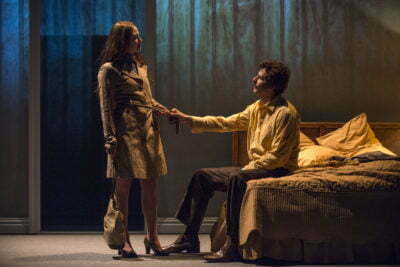Mary Page Marlowe
 By Tracy Letts
By Tracy Letts
Directed by Anna D. Shapiro
Produced by Steppenwolf Theatre Company, Chicago
Fragmented Life Greater Than Sum of Its Scenes
In the marketing materials for Pulitzer Prize winner Tracy Letts’s new play Mary Page Marlowe, Steppenwolf Theatre Company emphasizes that the titular character is unremarkable. I find it incredibly sad that so many people seem to think that this woman’s disaster of a life is normal. From infancy until death at what is today a relatively young age, Mary Page and her closest blood relatives battle addiction and wreck their relationships, finding peace only near the end. Letts and director Anna Shapiro tell this story non-linearly, and use six actors to represent the main character at ten points in her life (we also see her as a baby). Those devices force us to figure out what is going on in each scene, ironically resulting in us thinking more critically about Mary Page’s life than she does. It’s a satisfying puzzle, even with its dark picture.

We first see Mary Page Marlowe (played in her forties by Rebecca Spence) distracted and annoyed while taking her teen daughter, Wendy (Madeline Weinstein), and young son, Louis (Jack Edwards), out to lunch. The special occasion is her announcement that, following her divorce from their father, she’s moving from Dayton to Lexington, and at the end of the school year, so are they. Wendy is upset, but Mary Page doesn’t care very much, and refuses to say which parent’s idea this was. She also admits, after Wendy asks her, that she hadn’t given any thought to whether she would revert to her maiden name. As we shift forward and backward in time, we see that this callousness is typical for her, but she wasn’t always so blasé about her own life. As a teenager (Annie Munch), Mary Page turned down a marriage proposal because she didn’t want to be limited by someone else. Her own limitations turned out to be formidable enough.

It can’t ever be said of Mary Page that she is a particularly nice or smart person. What can be said is that she at least owns up to it—at fifty (Laura T. Fisher), her poor decisions result in an alcohol-fueled disaster which she accepts the consequences of, and her life finally starts improving because she does so. But we still get sent back plenty more times to see her empty flings, and her father (Stephen Cefalu, Jr.), whose untreated PTSD from Okinawa influenced him to mistreat her mother (Amanda Drinkall), who took it out on her. Mary Page was emotionally twisted from the beginning, and yet, she does superficially seem quite normal. All of the actresses who portray her do so realistically, which is remarkable since some of them have only a single scene. Simply that she is a three-dimensional person who appreciates and fears for those who love her entitles her to some sympathy, and the other characters she clashes with have their own share of the blame in what happens to all of them. This is the kind of outstanding ensemble acting Steppenwolf is known for, and only they could have given this play such a strong premiere.

Of course, eighteen actors in an eighty minute play is a big investment, even when it is as worthwhile as here. That is likely why Steppenwolf added seats in the pit, offering a more intimate experience. It is also significant that Steppenwolf has the technical resources to quickly change between Todd Rosenthal’s many sets. At most theatres, Letts’s shifts in location would have resulted in lengthy black-outs, but Shapiro found the right pace to make this story resonate emotionally while still leaving us with the distance to see the big picture. It was an accident that Mary Page survived her demons long enough to overcome them, while some other characters did not. It was her choices that caused other people to be unable to help her sooner, even when she sought them out. That’s not an earth-shattering revelation, but we see the dynamics at work very clearly, and feel their consequences. There were a few oddities at the opening show: some audience members loudly complained about the sound quality of an early scene (which wasn’t a problem for me), and most people were unsure of when the play was over. But the tone of the confusion was not hostile; it was the result of Mary Page Marlowe having been a well-rounded experience which required its audience to actively put together fragments. The people felt invested.
Recommended
Jacob Davis
Reviewed April 9, 2016
This show has been Jeff recommended.
For more information, see Mary Page Marlowe’s page on Theatre in Chicago.
Playing in the Downstairs Theatre at Steppenwolf, 1650 N Halsted St, Chicago. Tickets are $20-89; to order, call 312-335-1650 or visit Steppenwolf.org. Performances are Tuesdays-Sundays at 7:30 pm, Saturday and Sunday matinees at 3:00 pm (except select dates), and Wednesday matinees on select dates at 2:00 pm through May 29. Running time is eighty minutes with no intermission.
